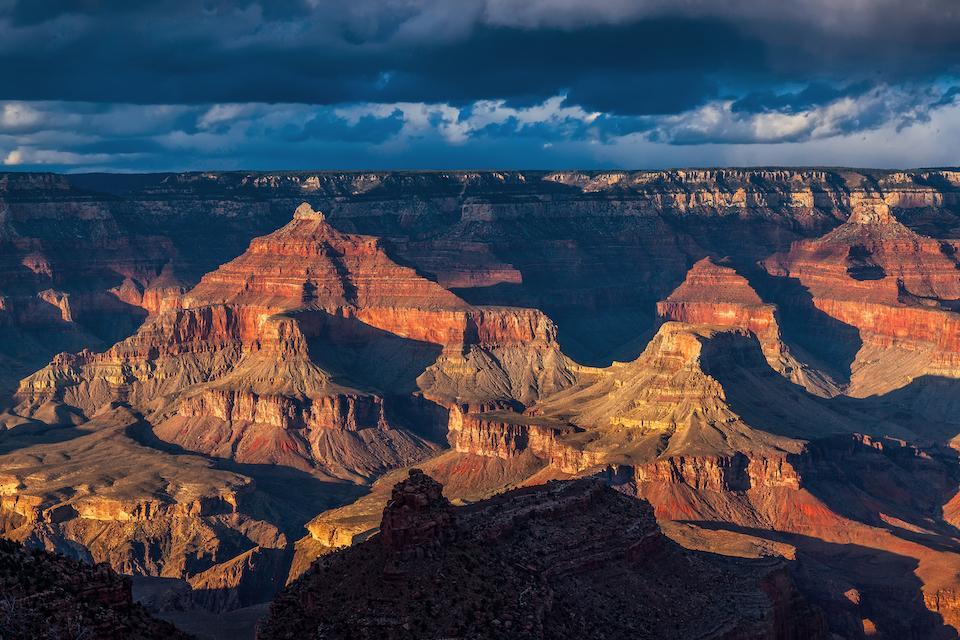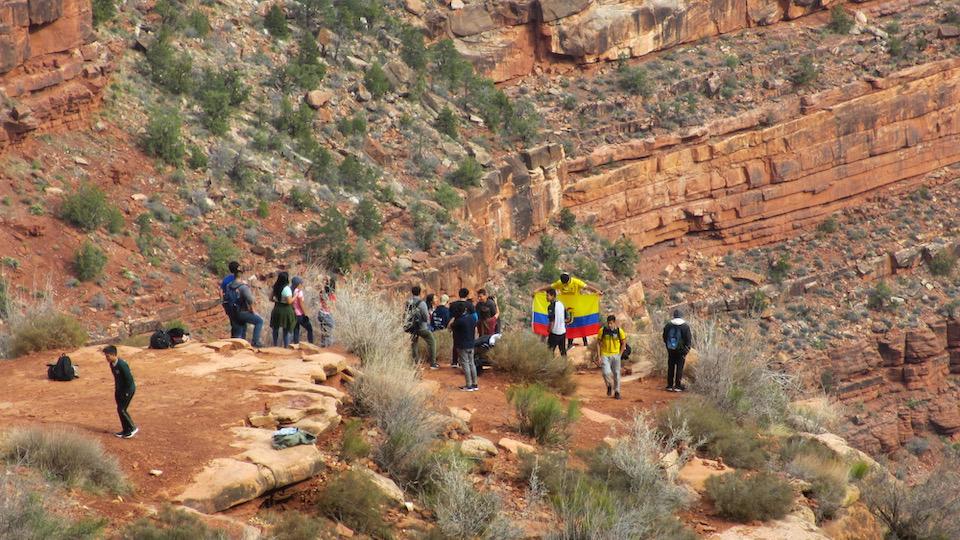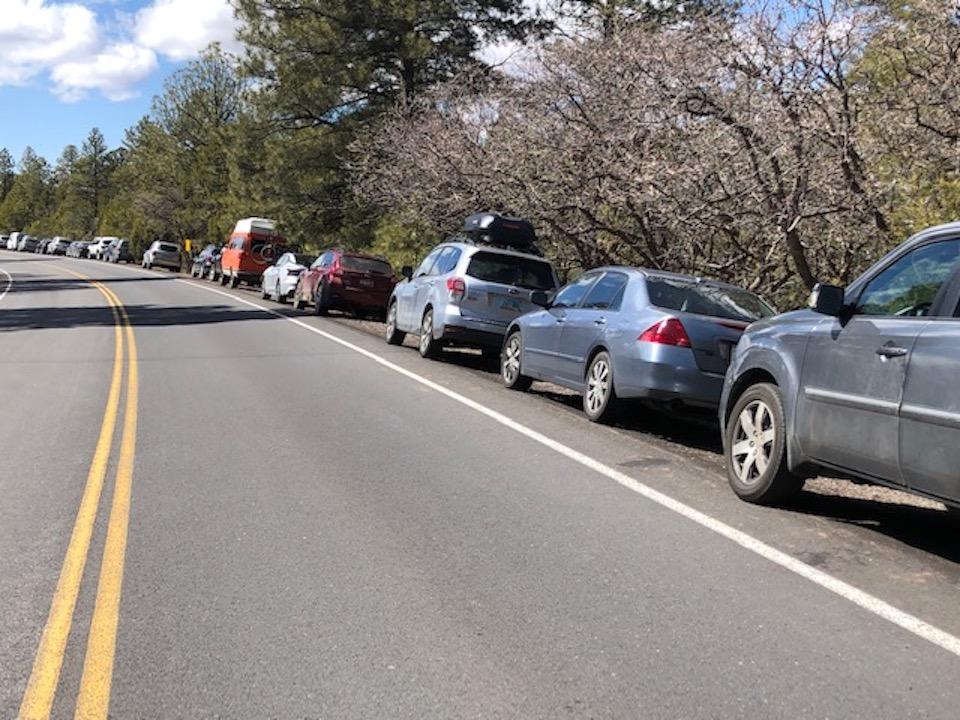
So far the National Park Service leadership has overlooked calls that Grand Canyon National Park be closed/Rebecca Latson file
Grand Canyon National Park remained open Saturday, days after the National Park Service's leadership team "supported" the park's closure due to the coronavirus pandemic and despite calls from local government and health officials that it be closed and internal recognition that the pandemic "is on a scale that we have never seen before."
As parks from coast to coast -- from Muir Woods National Monument and Yosemite in California to Yellowstone in Wyoming and New Bedford Whaling National Historical Park in Masschusetts -- either closed or greatly restricted visitor access, the decision to keep open Grand Canyon and Zion national parks, two destinations particularly popular for spring break, stood out.
"They're scared for their health and the health of the community and visitors," Kevin Dahl, Arizona's senior program manager for the National Parks Conservation Association, said Saturday, referring to the Grand Canyon park employees and South Rim residents he's talked with. "They wonder why hasn't it closed down when other national parks have closed down?"
Top Park Service officials, from the Intermountain Region's director who oversees Grand Canyon to David Vela, the deputy director who is the Park Service's de facto director, agreed with Grand Canyon's acting superintendent decision to close the park, according to a Wednesday evening email sent to Grand Canyon employees.
"Currently, the park has closure support from the (Grand Canyon) superintendent, regional director, and NPS director, as well as the Coconino County Board of Supervisors, the Navajo Nation, Tusayan Chamber of Commerce, and the Tusayan Fire Department," reads the email obtained by the Traveler.
Despite that support, though, the closure order has not been forthcoming.

Grand Canyon National Park still is popular with visitors, as this photo from March 26 shows/Slim Woodruff.
On Thursday, the Coconino County Board of Supervisors, whose county contains the national park, wrote Interior Secretary David Bernhardt directly, asking him to shut Grand Canyon down. That night, in a system-wide conference call, Vela along with Rob Wallace, the Interior Department's assistant secretary for fish, wildlife, and parks, praised Park Service employees for their dedication and assured them their "health and safety ... is a top priority."
Vela also mentioned without details that some Park Service employees have contracted COVID-19, adding that they reportedly were doing well.
"We send them our best wishes, and share your concern for their ongoing health and well-being," he said. "We are working with the public health staff to follow rigorous guidelines to protect you and our park places. Your safety and that of our volunteers and park employees are our top priorities. I want to thank you for the fortitude that you have all shown."
Keeping national parks open has been a priority of the Trump administration, and Secretary Bernhardt earlier this month waived all park entrance fees and encouraged visitors to get out into the fresh air of the park system. While individual parks have grappled with how best to operate during the pandemic, with more and more closing entirely, Interior officials believe the Park Service has developed the model for managing the public and the pandemic.
During the all-employee conference call, Wallace said the view from Interior was that "the best practices for how to respond to this pandemic rest with the National Park Service."
"In talking to the White House and other cabinet level agencies, it's also become the model that has been used throughout the federal government. People here are thinking about you, thinking about parks, thinking about how to manage forward our knowledge in the federal government," the assistant secretary added.
Not everyone in the workforce agrees with the messaging provided during the phone call, however.
"As the virus spread rapidly and local agencies began being proactive, our park unit has continued to downplay the seriousness of this pandemic," one park employee who asked to remain anonymous told the Traveler. "I feel that due to lack of proper management and lack of proactive response through closures, we have aided the spread of COVID-19."
"In my opinion, my park unit is not taking the COVID-19 pandemic seriously, and we are being socially irresponsible," the employee added.
Back in Arizona, Dahl said one ranger at Grand Canyon National Park expressed the view that they "were sacrificial lambs to this wrong-sided policy."

Parking was hard to come by near Yaki Point in the Grand Canyon on March 26/Slim Woodruff
Grand Canyon officials on Thursday did put in some visitor restrictions, closing the Bright Angel, Indian Garden, and Cottonwood campgrounds, and on Friday the Mather Campground was closed, as well. Also closed were the Desert View Campground, Trailer Village, and the RV and Camper Services building.
Visitors were, however, able to enjoy overlooks along the South Rim of the park.
Keeping the Grand Canyon open, and other units of the park system for that matter, could inadvertently help spread the coronavirus, as travelers will stop for gas and go into convenience stores or restaurants as they travel to and from parks. Inside the parks, such as Grand Canyon with its overlooks, visitors risk coming in close proximity with others. For many at the Grand Canyon, the first thing they do once finding a parking spot is head over to the visitor center and Mather Point to gaze down into the canyon.
"Any gathering is bad, and people who are being forced to work, it's really bad," said NPCA's Dahl. "If they (NPS and DOI) don't take the appropriate action, then they're not serving, not only the employees, but the public."
On Friday, Coconino County officials tried again to get the park to close down, writing to Grand Canyon acting Superintendent Mary Risser with a plea that the park be closed.
"We are writing with extreme concern for any decision to keep the Grand Canyon National Park open in the midst of the COVID-19 pandemic," reads the letter signed by the chairwoman of the Coconino County Board of Supervisors and the director of the county's health and human services department. "Our County Health and Human Services Department is advising all residents and tourists to practice social distancing and implement appropriate public health measures to help contain and mitigate the transmission of COVID-19.
"We encourage our federal partners to model that same behavior for the public health of the county."
Despite those pleas, the official Park Service position Saturday was that the proper health assessments haven't been completed in regard to the threat Grand Canyon National Park may or may not pose.
"We are working within the local and the State of Arizona's Health Department's as well as the CDC's guidelines, and from what I understand they have not changed their guidance for Grand Canyon National Park nor has the State Health Department asked for any change," said Alexandra Picavet, the Park Service's acting chief spokesperson.
The Park Service employee who reached out to the Traveler not only pointed to the decision for their park to remain open despite county orders that residents stay home -- "If everyone is supposed to be at home, why are we encouraging people to visit and violate the order/law?" -- but also said staff lack the proper protective equipment to stay safe when contacting visitors.
While restrooms and trash cans are closed, they still presented health problems.
"As the weekend approaches, the trash will start to pile up next to and on top of the trash receptacles, leading to animals scavenging, and overall filth," they said. "There are no water sources or hand sanitizer for people to use after they all touch the door handles of the closed restrooms. I sat at one restroom area for approximately 30 minutes and every person who came into the parking lot went to the restrooms and tried the door handles. If there was one infected person in that group, now hundreds have been exposed."
Staffing also was becoming a problem as sickness is depleting ranks, the employee said, adding that "We didn't have sufficient staffing before COVID-19."
Such issues would be tackled by the Park Service leadership, Mike Reynolds, the agency's acting deputy director for operations, told those listening in to Thursday night's employee conference call.
"I want you to know, we are sensitive to the concerns we are hearing from the field and we are trying to get answers," Reynolds said. "I won't give up if you don't give up. If you are not getting the right answers, the team will not quit until we get them out the best we can."



Comments
You need to close the park. I was there staying at Maswik and also Phantom Ranch between Feb. 22-26. I believe that I could have been exposed to the Corona Virus there. After I returned home I became ill with 3 of the symptoms of Covid 19 after 5 day.... I stayed in the Dorms and ate food in a room with 50 people passing food around. NO one in my community would test me or my husband When he got sick 1 week later with even worse symptoms (4) They didn't have enough tests. We'll find out soon we hope.
I am fit but 67 years old. There were lots of older people there too that we're in not so great shape. Other concerns were the cleanliness of the room at Maswick and the food court there. I don't blame the workers being concerned about what guests are bringing to them. SHUT IT DOWN.
There is such a rich irony here. According to this article, the "official Park Service position" offered by the NPS on Saturday (today) as a reason for delaying at least a temporary closure of this park was that "the proper health assessments haven't been completed in regard to the threat Grand Canyon National Park may or may not pose."
Now, I can't remember how many, but there have been aquite a few, recent NPT articles covering the debate over the NPS summary decision to open parks to the use of e-bikes, which the NPS issued without even beginning to conduct any such "proper assessments" of health or safety risks. Kurt Repanshek, myself, and a host of other commenters were bitterly condemned when we tried to explain that, while the use of e-bikes on park trails might, after a competent formal study, turn out to be perfectly fine, the arbitrary and capricious manner with which the NPS issued that decision, without "proper assessment" of any kind, broke established NPS policy and procedures, set a bad precedent for good governance in the future, and was, therefore, not fine.
So, is it now also fine, apparently in an extension of the bad precedent established by the e-bike decision, to arbitrarily and capriciously pick and choose, seemingly based on nothing more intellectually grounded than one of Trump's PIDOOMAs, which decision needs to go through formal review and process and which does not? I guess the Free Dumb Caucus might think this appropriate; but, it seems disturbing like bad, if not downright corrupt, governance to me.
Why hasn't the Tusayan Town Council done the right thing? They've done nothing to dissuade tourist visitation since the "stay at home" recommendations have been made. Responsible businesses have closed, the town has made no efforts to dissuade the others. They've not shown any support for Grand Canyon shutting down. Every day the residents and employees are being exposed to out of state travelers. Isn't the local government supposed to look out for the health of the residents? This is despicable and cowardly!
We're talking about people's lives!!!
As a resident just going to the grocery store which is the only thing open is filled with out of state visitors buying our supplies and I am noticing many California tags. Please for our safety in a small community close us down. The Grand Canyon is not essential travel!
I am a resident at the park, and the majority including myself, co-workers, friends and neighbors think the park should close. Our safety and health is at risk, and we have very limited medical facilities in the park. We are the backbone of the park, we work hard and make the park function and help the guests experience an unforgettable visit. We are more important to have around healthy than not. I think some of the decision makers on keeping the park open, really don't know, see or understand how important the local residence are. We are more important than visitors possibly bringing in the virus.
CLOSE THE PARK
The Grand Canyon gets too many visitors to be open at this time. It is inevitable that the 6-10 distancing rule will be violated and as such Covid-19 will be shared. Additionally, it is a mixing spot with people from all over the country, and even the world, come and spend time in close association at viewpoints and facilities. It appears that many of them can be Covid-19 carriers. It seems appropriate to shut the gates and totally close it down for the next month at least.
As a long time volunteer at Grand Canyon, I know something about the park. It does not take much imagination to understand that all those visitors that need a restroom after the long drive to the park are going to defecate somewhere. Add to this the lack of toilet paper and running water and you have a severe health hazard.. Park employees do not generally have anywhere else to live, they cannot escape this filth. Please close the park for the safety of it's most valuable asset, it's employees.
I believe at this point, the Governor has to assign the National Guard or state troopers to enforce a closure or restriction of travel on State route 64. Stay tuned.